Starlink is stretching its footprints in the African market space, with a promise to offer faster and reliable broadband service.
Starlink’s founder Elon-Musk said on February 5 that the company awaits regulatory approval from Tanzania before they can start operating.
He confirmed Tanzanian entry in a tweet chat with an American entrepreneur, Mike Coudrey, who requested the billionaire to make Starlink available in East Africa.
Coudrey asked Musk to “make Starlink available in Eastern Africa, specifically Tanzania so people can have a higher access to information and build a better future.”
In response, Musk said “we would love to. Just waiting for government approval,” signalling opening up of the African market.
The Tanzanian government has already responded to Starlink with Musk set to complete the essential documentation for subsequent procedures to take place.
Musk requested to start operating in Tanzania on October 6, 2022 and the last meeting on regulatory approvals and licensing was on January 27, 2023. Tanzania dismissed claims that it had denied Musk entry into East Africa’s sixth most populous country with 59 million people.
“We received the applications on October 6 last year. A number of issues are pending following our last meeting on January 27, 2023,” said Tanzanian Minister for Information, Communications and Information Technology Nape Nnauye.
New Investment Laws in Tanzania
In December last year, Tanzania enacted a new law touching on investment -Tanzania Investment Act No.10 of 2022, repealing the Tanzania Investment Act No. 26 of 1997.
The new Act partly touches on land and would remain a challenge for foreign investors and their interaction with Tanzania Investment Centre (TIC).
The previous Act assumed that TIC would oversee a ‘land bank’ where land set aside for investment purposes would be readily available.
Foreign investors in the new Act go through an occasionally lengthy process of identification and conversion of land from one category to another (village to general land for example) in order to obtain derivative rights from TIC.
Dr. Jabiri Bakari, Director General of Tanzania Communication Regulatory Authority (TCRA) said that Starlink, like any other firm, must follow the appropriate processes before getting an operational license.
“You know, Starlink’s satellite internet involves much more issues. It involves different particulars that need different requirements from the regulator in line with the type of license being applied for,” said Dr. Bakari when he spoke to Tanzania’s publication The Citizen.
The minimum investment capital threshold for foreigners in Tanzania is capped at $500,000.
So far, the company has launched operations in Nigeria, with the latest entrant being Rwanda.
According to Rwanda’s The New Times, the service will initially offer no contracts, but will, instead, offer a 90-day trial.
The service is set to cost $44 per month while a customer is to pay $70 for hardware.
Conquering African Market
In Kenya, Starlink is set to operations in various cities including the country’s capital Nairobi, Kisumu, Mombasa, and Nakuru, by June 2023.
The service would offer a 30-day trial where if not satisfied, a customer can return the hardware for a full refund.
To get Starlink in Kenya, one will need to part with $599. Anyone in the country can place a pre-order and deposit a fully refundable deposit of $99 to reserve a kit as the firm awaits regulatory approval.
There are plans to extend Starlink services to 20 more regions to tap into the African market.

